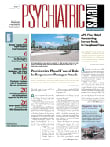In the dark recesses of the brains of adolescents with bipolar disorder, some troubling things may be happening.
A number of scientists have found that the amygdala, the brain's fear center, is diminished in size in such youth, and this shrinkage may contribute to the emotional dysregulation that characterizes their disorder.
Now Yale University scientists have discovered that three other highly connected brain structures are also reduced in size in youth with bipolar disorder.
The structures are the orbitofrontal cortex, located in the front of the brain over the eyes; the insula, which is folded deep between the frontal and temporal lobes; and the temporopolar cortex, found inside the temporal lobe.
The senior researcher on the study was Hilary Blumberg, M.D., an associate professor of psychiatry at Yale University. The results was published in the July Brain.
Blumberg and her colleagues found through structural magnetic resonance imaging that there was a significantly decreased volume of these brain areas in 41 adolescents with bipolar disorder when their brains were compared with those of 77 healthy control subjects. And as Blumberg explained to Psychiatric News, the type of statistical analysis performed showed that the bipolar subjects had a decreased volume on average, not necessarily that each subject had a decreased volume.
These findings make sense, the scientists believe, since these three brain areas are connected with the amygdala as well as with the hypothalamus and thus are able to regulate not just emotions, but circadian rhythms, sleep, appetite, and sexual functions—all of which can be disrupted by bipolar disorder.
The scientists also looked to see whether psychotropic medication use could have influenced their results, since 31 of the 41 bipolar disorder subjects were taking lithium, anticonvulsants, or another psychotropic medication.
No significant effects were detected for the presence or absence of psychotropic medications on the regions that showed significant differences between the bipolar group and the control group. But when explored with a less strict threshold, a trend was noted toward larger orbitofrontal volumes in the bipolar subjects on psychotropic medications than those not on them.
These findings have two implications, the scientists noted: "The volume decreases in the adolescents with bipolar disorder were not due to medications, [and] medications may have the potential to attenuate or reverse volume deficits in adolescents with bipolar disorder."
The results also have additional clinical significance, Blumberg told Psychiatric News: "Improved understanding of the developmental processes that contribute to bipolar disorder, and the specific neural circuitry involved, could guide the development of more effective treatments."
The study was funded by the National Institutes of Health, the Department of Veterans Affairs, the Brain and Behavior Research Foundation (formerly NARSAD) and other groups.
